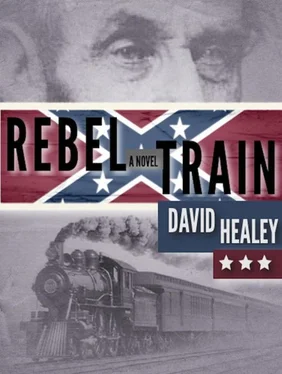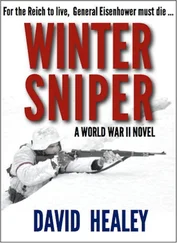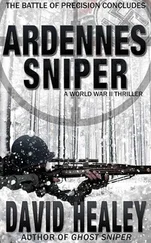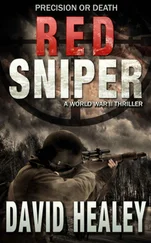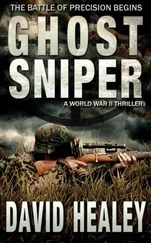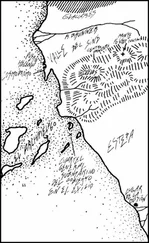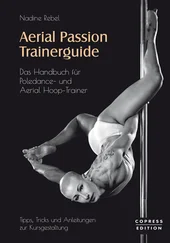He took a quick look over his shoulder and saw Schmidt and Frost still lagging behind. Greer had hoped a few soldiers would join the chase, but so far only the engineer and fireman were in sight.
“Run!” he shouted at them. “We’ve got to catch that train!”
• • •
Inside the passenger car, Flynn saw that Benjamin still had his Colt at the ready, and the lad was keeping a close eye on the passengers. He looked pale, but the hand that held his revolver was steady enough. The passengers themselves were coping by various degrees. Some sat stone-faced, others cried, a couple of men looked angry enough to try something foolish, but Flynn decided they must be unarmed, or else they would have acted along with the two men he and Benjamin had been forced to shoot.
The blustery old couple, Alfred and Henrietta, looked indignant and rumpled, like hens caught in the rain. The image made Flynn smile, but his grin faded when he noticed the Baltimore tough and his woman. There was not the slightest hint of fear on their faces. Among all these hens, they had the look of foxes, Flynn thought. Cunning. The gunfight hadn’t scared them a bit.
He touched Benjamin’s arm. “Keep an eye on those two,” he whispered. “They’ll be the next to make a move.”
“All right,” the boy said.
He gave Benjamin’s arm a squeeze. “You did good, lad,” Flynn spoke quietly. “Those men didn’t give us any choice.”
“I know.”
“If it comes to using your gun again, lad, don’t hesitate,” Flynn warned him. “If you do, you’ll be the dead man next time. Shoot first, think later.”
Benjamin nodded, as if he understood. Flynn hoped the boy did, because he was sure many more shots would be fired before the day was through.
• • •
Greer’s arms were on fire and his legs felt heavy as logs, but he would be damned if someone was going to steal his train and get away with it. He kept running.
Slow as the train had started, it quickly gathered speed. The harder Greer ran, the further ahead the train seemed to get. Soon he watched it disappear around a bend, and he staggered to a halt, doubled over, and gasped for breath. Frost and Schmidt ran up behind him. They hadn’t been running nearly as hard and weren’t as winded, and they had brought along a young captain astride a chestnut mare. No other soldiers were in sight.
“Where were you five minutes ago?” Greer panted, glaring at the mounted officer. He hawked and spat, trying to catch his breath. “You could have caught them on that horse.”
“What seems to be the trouble?” the captain asked. He was no more than twenty-one or two, young and arrogant.
“Deserters stole my train,” Greer snapped, the captain’s nonchalance beginning to gall him. “That’s the trouble.”
“What deserters?” the captain asked.
“From your regiment, most likely.”
“We don’t have any deserters that I know of.”
Greer scowled, but the captain appeared not to notice. Greer started over from the beginning. In the distance, he could hear the sound of the train— his train — receding and finally being lost in the noise made by the nearby Patapsco as it gurgled over the rocky riverbed.
“Someone took our train,” he said. “If you send ten men with me, I’m sure before long we’ll find the train stopped down the tracks a mile or two from here, and your boys can arrest—”
The captain held up a gloved hand. “That train is your concern.”
“But deserters—”
The captain wheeled his mare and started back toward the station. He called back over his shoulder: “Maybe deserters took your train, but they weren’t ours. It’s none of my concern.”
Greer cursed as the captain rode off. He couldn’t believe the officer wouldn’t help. Someone had stolen the train, and the captain didn’t give a damn. With officers like that, no wonder it was taking so long to win the war. He was just like all the rest of the fools back at First Bull Run who had gotten him wounded and then lost the battle.
“Come on,” he growled at Frost and Schmidt. “We’ll find our own goddamn train.”
Greer started off down the tracks at a jog. Frost and Schmidt were right behind him.
“This doesn’t look good,” Schmidt said. “We let our train be stolen. If anything happens to the Chesapeake , we can say goodbye to our jobs on the railroad.”
They ran a little faster.
• • •
Colonel Percy left the first passenger car and climbed toward the engine, sending Cook, Hazlett and Forbes back to join Captain Fletcher in keeping watch over the passengers. He didn’t trust Fletcher on his own. None of the passengers in their car had given them any trouble when they announced the takeover of the train. Of course, the Colt revolvers in the raiders’ hands had not encouraged the passengers to speak up.
Pettibone stayed to guard the engine. Percy climbed over the tender — an open car stacked high with wood — and onto the locomotive itself, where Cephas Wilson and Hank Cunningham worked like madmen to wring more speed out of the Chesapeake .
Wilson sat in the engineer’s seat to the extreme right of the cab. He had the throttle wide open, but he was now working the Johnson bar back toward the neutral position.
“Give me a hand, Colonel,” Wilson said by way of greeting. Because of all the steam pressure, the Johnson bar was incredibly difficult to move. Wilson had straddled the bar, with one foot on an iron stirrup and the other on a wooden chock. Both footholds had been put there to give an engineer leverage when wrestling the bar forward or backward. Percy grabbed hold, and the two men managed to work the bar back until it was nearly straight up and down.
“Don’t you want this all the way forward?” Percy asked. The Johnson bar was basically a combination of gear shift and throttle. Pushed all the way forward, the locomotive went at its greatest speed, while the middle position left the engine virtually in neutral.
“We’re rolling along pretty good now,” Wilson explained. “With the reverse lever in that position we’ll save wood and water and still make good time.”
The engine had been slow getting out of Sykesville and Percy was concerned that unless they built up speed and put some distance between the town and themselves, cavalry might catch them if they slowed down for any reason.
“How is she running?” he shouted over the roaring engine.
Wilson answered with a wide grin. “She can roll, yes sir, she can. With the throttle wide open she’ll maybe do sixty miles an hour on a level stretch.”
“How fast are we going?” Percy shouted.
Wilson looked out the window at the ground. Any experienced engineer could tell within ten miles per hour how fast his train was going by how blurred the ground below looked.
“About forty,” he said.
“Can we go faster?”
Wilson laughed and jerked his chin at the tracks ahead. The bright steel rails closely followed the river bed, twisting and turning with the narrow Patapsco.
“You want us to end up in the river? She won’t stay on the tracks at sixty. Not here, anyway. I’ll keep her at forty, Colonel. There’s still not a horse that can catch us.”
“All right,” Percy agreed. He would have liked to run faster, but he had to admit that even forty seemed like a reckless speed as the gray, leafless trees flickered past.
“We’ll open her up once we get beyond the Patapsco,” Wilson said. “It’s good, flat country up ahead.”
Hank Cunningham shoved by with an armload of wood. His coat was off, his sleeves rolled up, and sweat stood out on his face as he threw open the door to the firebox and tossed a chunk of wood into the glowing red maw. He was careful to keep the wood in an even layer several inches deep so that it created an even heat inside the firebox.
Читать дальше
